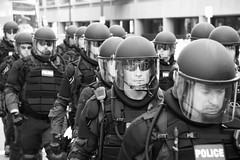One of the notable attributes of a society degrading into a police state is the duality of both an intense fear [2, 3, 4] and an exaggerated glorification of its police force. As the force is increasingly adored by those who feel protected by them, they are supported in their continual acquisition of armaments, equipment, and training, all this of course helping instill fear in both would-be enemies and the populace at large.
While the most common police slogan is “to protect and to serve”, one of the core elements of police work is the use of fear to intimidate those with whom you must interact. As one example, consider the “Hercules teams” used in New York City for the sole purpose of startling those who witness them:
“The response we usually get is, ‘Holy s—!’” [NYPD Detective Abad] Nieves says. “That’s the reaction we want. We are in the business of scaring people–we just want to scare the right people.”
Such a display of power and might naturally leads a not-so-well-equipped group of people to respect them and fulfill their every request. This principle is likewise implemented by school bullies and gangs. In all such scenarios, those who use muscle to mandate respect often succeed (at least in the short term). Though based in fear, this respect and honor increases if the individuals feel protected by the bully; so long as the bully is on your side, he’s your friend.
Thus, the door opens to glorification, where those who decide to make a career out of police work are treated like Saints. Utah’s own Attorney General is one of those who seemingly worship the ground upon which the police walks, memorializing the deaths of those who have fallen in the line of duty.
Insofar as these individuals were legitimately serving the public and discharging their duty with honor and virtue, then their loss of life should be mourned. But is it appropriate to so elevate our police force above the normal citizenry that every injury or death incurred is mourned with statues, signs, fanfare, and flag-draped coffins?
Individuals who voluntarily choose to make a career out of police work do so knowing the inherent risk that is in the job. But does the same not apply to electricians, pilots, and construction workers? It may seem odd to compare a policeman’s job with these others, but consider the following table that, while nine years outdated, puts into perspective the risk of police work:
|
U.S.
Department of Labor Occupational Fatalities per 100,000 Year 1999 |
|
|
Commercial
Fishermen |
162
|
|
Timber
Cutters |
154
|
|
Air
Pilots |
65
|
|
Construction
Laborers |
37
|
|
Garbage
Collectors |
34
|
|
Truck
Drivers |
28
|
|
Electricians
|
12
|
|
Gardeners
(non farm) |
11
|
|
Police
|
11
|
|
Carpenters
|
7
|
| (source) | |
This table illustrates how police work is not as dangerous as certain other careers. None of these jobs are compulsory, and so an individual choosing either one of these fields of work faces some risk to life and limb. Shall we start erecting statues to fallen florists and fisherman?
Those who scoff at such a suggestion might claim that a policeman is serving the public by protecting them and coming to their aid when called upon, unlike the individuals in the other professions listed above. This is a fallacious argument, for like the carpenter and pilot, the policeman is simply rendering a service to his employer—you. Policemen are hired and paid by the public to fulfill a legitimate need. The same holds true for any other enterprise. If I felt my life was under a higher threat, I might hire a bodyguard. If I felt my life was threatened by obesity, I might hire a personal trainer. Whatever the situation may be, it boils down to a simple economic exchange by which a service is rendered and payment made.
It should also be mentioned that the decision in Warren v. District of Columbia clarified that the police are not duty-bound to come to your rescue as you plea. The Court claimed that it is a “fundamental principle of American law that a government and its agents are under no general duty to provide public services, such as police protection, to any individual citizen” (Warren v. District of Columbia, 444 A.2d 1 (D.C. Ct. of Ap., 1981)). As ludicrous as this may sound, what the Court is telling you is that despite hiring the police to render you the service of protection, they are not obligated to fulfill their end of the agreement. Or, in other words, the police are legally justified in not honoring the implicit contract that exists between them and the people.
I do not honor the police any more than I honor the hardworking entrepreneur, the chef at the local bakery, or the diligent college professor. Any individual who works hard to fulfill a moral need of society is equally entitled to our praise and appreciation (not to mention the fact that all are compensated for their time and energy). The glorification of our police force, the fear used to achieve such an end, and the elevation of police work over the other needs of society should all be repudiated and exposed for the fraudulent fallacies that they are.
Continue reading at the original source →




